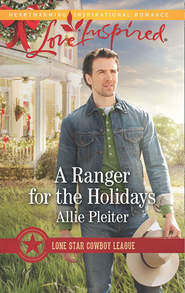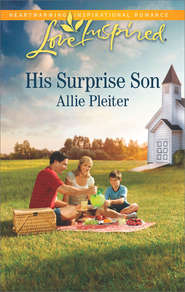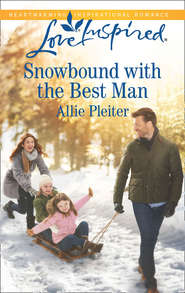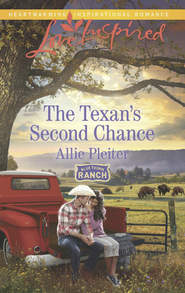По всем вопросам обращайтесь на: info@litportal.ru
(©) 2003-2024.
✖
Mission of Hope
Настройки чтения
Размер шрифта
Высота строк
Поля
“That’s it, isn’t it? And there should be another one—a long, narrow one—right beside it somewhere.”
Quinn stared from Bauers to the pair of chests, his heart thumping as he recognized the shape of the long narrow box. He must have been, what, twelve? Surely not much older. He caught Bauers’s gaze, the old man’s eyes crinkling up when he read Quinn’s expression.
“Mr. Covington’s things.” Quinn began tearing through the boxes, bags and beams between him and the pair of chests. “Those are Mr. Covington’s…”
“No, man, not just Mr. Covington’s, and you know that. Those belong to the Bandit.”
Quinn had reached the chests, fingering the latch on the longer box. He remembered what was inside now. He remembered thinking that that sword and that whip were the most powerful weapons on earth. He blew the dust off the box and set it atop a crate. “Do you think it lasted?”
“I see no scorch marks or dents. I’d venture to say it’s in perfect shape.” He picked his way quickly through the room until he stood next to Quinn. “But we’ll not know a thing until you open it.”
Chapter Four
With a deep breath, Quinn undid the pair of latches on either side of the long wooden box. Inside, carefully nestled in their places on a bed of still amazingly blue velvet, lay a pair of swords. Even with the patina of twenty years, they gleamed in the basement’s faint light. “His swords,” Quinn remarked, not hiding his amazement. “The Bandit’s swords.”
Reverend Bauers’s hand came to rest on Quinn’s shoulder. “So many years. Such a long time ago—for both of us.”
Quinn could hear the smile in Reverend Bauers’s voice, sure it matched his own as he remembered the daring heroic feats of the Black Bandit that had once captured his young imagination. A dark hero who roamed the streets at night, offering aid to those who had none, supplying food to needy families, even sending money once to fix Grace House. The Black Bandit legend had woven its way into San Francisco’s history—everyone’s mother and grandmother had a Black Bandit story—but Quinn and the reverend were two of the only four people in the world who knew Matthew Covington had been the man behind the mask. He cocked his head in the clergyman’s direction. “Wouldn’t we like to have our Bandit back now, hmm?”
Quinn picked up the sword, turning it to catch the light. When he was twelve, this sword had seemed enormous. Too heavy and long for a slight boy. Time and trials had done their work on Quinn, however, and he was a tall man of considerable strength. He wondered, for a moment, if he remembered any of the moves Mr. Covington had taught him. “Do you remember that day, Reverend?”
There was no need to explain “that day.” Bauers would know Quinn was referring to the day he met—and marred—the noble English businessman. Bauers’s smile and nod confirmed his understanding. “Evidently, I’ve remembered it better than you. You, who have the most reason of all to remember that day.”
Quinn’s introduction to Matthew Covington had been, in fact, by injury. He’d taken a knife to Covington’s arm as the Englishman tried to stop a robbery. A crime Quinn and his buddy were attempting—stealing from Grace House. It was amusing, in a sad sort of way, to think they’d thought times hard enough to steal from a church back then. Those times were nothing compared to what they were now.
Still, Quinn was young, impressionable and desperate for decent food. His father’s love of the whiskey bottle hadn’t made for much of a steady home life. Trying to steal from Grace House Mission—an organization bent on helping his impoverished neighborhood—had been the low point of his life.
It had also been the turning point. Back in that garden, watching Matthew Covington bleed, Quinn had realized he had two choices in life: up or down. Dark or light. Hard or easy. And, when it came right down to it, destruction or redemption. That day Quinn chose to climb his way out of the mess his young life had become, and Reverend Bauers had been the first to recognize it. That troublesome day, and the tense ones that followed it, marked the beginning of Quinn’s unusually close relationship with the reverend. Uncle Mike had been known to say that Bauers was the real father Quinn never had; and it was true.
Quinn swung the sword in a gentle arc. It felt so light now. “Do you think he knows? Everything that’s happened here?”
Bauers smiled. “Matthew and Georgia wired money last week and asked that we wire back a list of needed supplies. His own son is fifteen now.”
Quinn tilted the sword again, admiring it. Even though Bauers had only been able to secure him a year or two of fencing lessons, he knew it was an outstanding weapon. It had a graceful balance and tremendous strength.
As wondrous as the sword was, it wasn’t the weapon most people associated with the Black Bandit. Catching Bauers’s eye, Quinn flipped open the second chest. There it lay, on top, carefully coiled; the Bandit’s leather whip. His mind wandered back to the summer afternoons where Quinn would swish a length of rope around the Grace House garden, pretending at the Bandit’s skill with his whip. Quinn lifted it carefully—it hadn’t survived the years as well as the swords. Bits of leather disintegrated with every flex, and the rich black braids were a stiff and crackled gray. He found himself afraid to uncoil it, simply moving it to the side to gain access to the rest of the chest’s contents. It contained exactly what he knew it would: a pair of black boots with a small silver B imbedded in each calf, a trio of dark gray shirts—voluminous, almost piratelike in appearance—and a black hat with the remnants of a white feather beside it.
And there, at the bottom of the chest, lay the mask. An ingenious thing, the Bandit’s mask was almost a leather helmet with a strip that could either come down over the eyes or fold up into the hat. Covington had let him try the mask on once, and the thing had nearly slid off his head. Quinn raised the mask into the light, inspecting it. It had held up much better than the whip, still surprisingly supple even after so much time. He couldn’t help but smile at the memory of the Bandit’s myriad of adventures. “Mr. Covington should have kept these.”
The reverend’s expression changed. “I don’t think that was the plan. He gave those to you. And Matthew Covington did everything for a very good reason.”
That made Quinn laugh. “I’ve not much use for a sword and whip, now do I? Although I could put the boots to good use.”
Reverend Bauers leaned his heavy frame against a dusty chest of drawers. “It makes one wonder.”
“What?”
“What else you could put to good use.”
It took Quinn a full ten seconds to gain the man’s meaning, at which point he dropped the mask. “You’re not serious.”
The sparkle in Reverend Bauers’s eye was unmistakable. “Why not?”
Quinn squared off at the man. “I’m a bit old for adventure stories. And times are a mite harder now.”
Bauers folded his arms across his chest. It was a gesture Quinn knew all too well, and he did not like the look of it.
“Matthew was close to your age when it all started. And it all started with a story.” He caught Quinn’s glare. “Stories are meant to be told. And retold.”
“I’m not Matthew Covington,” he said, because it needed saying. Covington was a clever, wealthy man who’d done remarkable things.
“No, Quinn. You’re you. Matthew knew that, too. What if you are exactly the man we need? Do you really think we’re down here digging in the basement for no reason at all?”
Quinn sank down on a crate. “I hardly think God brought me down to your cellar to ask me to be the Black Bandit.”
It was a long moment before Bauers answered simply, “How do you know?”
“Because it’s insane. I’ve barely enough food to eat, my shoes have twelve holes in them, the city’s barely getting through the day, I’ve no money, no influence and barely a spare hour to think.”
Bauers’s face split into a satisfied grin. “But you found enough time to help an old man go through his cellar. You found enough time to build those little ones that toy you told me about. You know what I always say—there’s always enough time to do God’s will.”
Even as the mail cart bounced its way a block from Aunt Julia’s house, Nora could tell something was happening. The house seemed almost bustling, with Mama and Aunt Julia scurrying around the yard and porch with a speed and energy Nora hadn’t seen in a while. A gracious table—or as gracious a table as one could manage these days—was set up on the porch.
Tea. Mama and Julia were setting out afternoon tea. And while afternoon tea had recently meant cups and saucers on mismatched plates with whatever crackers could be managed, this tea was different. It took a moment for Nora to realize what Mama and Aunt Julia were actually doing; they were entertaining.
“There you are,” said Mama hurriedly as the cart rattled its way into the drive. “Goodness, I thought you’d miss it altogether. Run upstairs, find whichever dress is the most clean and put it on. She’ll be here soon.”
“Who?” Nora and her father asked at the same time.
“Mrs. Hastings.”
“Dorothy Hastings? Here?” Papa asked. “I didn’t think she was still in town.”
“She’s returned.” Mama said it almost victoriously, as if it were as significant a societal achievement as the streetcar lines coming back into service. “And she’s coming here.”
The Hastings family was a social pillar of San Francisco. Mr. Hastings was on the Committee of Fifty—the emergency governing body that Papa served. Mrs. Hastings, like many of the city’s finer families, had removed herself from the city to safer environs. Why she was in town at all, much less at Aunt Julia’s house, Nora could only guess. Still, it was clear her visit was important to Mama. Perhaps even more than that, the opportunity to host someone, especially someone so important, seemed to light a spark in Mama and Aunt Julia that had been gone since the earthquake. A spark, when Nora was honest with herself, she hadn’t been sure would return. That relief made Nora practically dance up the stairs to find whatever dress seemed the least tattered.
She found a frock—a deep rose that hid dust and dirt especially well and whose neckline showed off the locket to particular advantage—and a small pink flower that had fallen off a hatpin to tuck into her hair. It did feel wonderful to “dress up,” even just this small bit. She had no idea how Mama and Aunt Julia could pull together any kind of tea under the circumstances, but they were highly motivated and resourceful women. And the combined skills of the two household cooks had managed some wondrous meals given the lack of foodstuffs. Half of Nora understood her father’s amused scowl at the whole thing. She was sure Papa found the whole exercise to be simply a diversion for his wife. Even if Mr. Hastings was in charge of city services, tea seemed rather pointless.
Still, the other half of Nora understood how valuable it could be right now. To engage in something—anything—for the mere pleasure of it seemed a dear luxury. A tiny, beautiful shield against the endless, tiresome obstacles of rebuilding. Not unlike, she realized as she fixed the small flower into the corner of her chignon, Quinn’s teeter-totter. Papa might consider that a pointless diversion as well, and yet she recognized the plaything’s value.
Nora was just dusting off her skirts a second time when Mama entered the room. The real Mama, not the wisp of a woman who had seemed to occupy Mama’s skin for the last few months. She’d been praying nightly for God to return the light to Mama’s eyes. Today, those prayers had been answered.
For days after the earthquake, Mama had carried all her good jewelry around in a pocket tied inside her skirts. There was no safe place to put anything, and no one knew, as the fires ate up more and more of the city in an arsenal hunger no one could quite believe, when a hasty exit might be required. Over and over again during those first weeks, Nora had watched her mama lay her hand over the lump in her skirts. Checking to be sure it was still there or perhaps just shielding the trinkets from the horrors of the outside world. Eventually, Uncle Lawrence had produced a lockbox for Mama and Papa, and their valuables went in there. Nora thought it was far too tiny a thing to hold a life’s valued possessions, but then again, Nora had had to rethink a lot about life’s valued possessions in recent weeks.
Today, Mama had her pearls around her neck. And Grandmama’s pearl ring—a piece that belonged to Mama and Aunt Julia’s own mother—graced her right hand. It wasn’t the beauty of the jewelry that made Nora smile, it was the way Mama carried herself when she wore it.
Mama came over and readjusted a curling tendril that fell from Nora’s chignon. “You look lovely,” Mama said. “But I think,” she said delicately, “that it would be kindest to tuck the locket inside your dress.”











